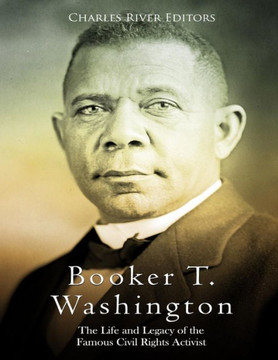*Includes pictures *Includes quotes *Includes online resources and a bibliography for further reading "Men may make laws to hinder and fetter the ballot, but men cannot make laws that will bind or retard the growth of manhood. We went into slavery a piece of property; we came out American citizens. We went into slavery pagans; we came out Christians. We went into slavery without a language; we came out speaking the proud Anglo-Saxon tongue. We went into slavery with slave chains clanking about our wrists; we came out with the American ballot in our hands. Progress, progress is the law of nature; under God it shall be our eternal guiding star." - Booker T. Washington From 1890-1915, the most influential black man in America was Booker T. Washington, who less than 35 years earlier had been born into slavery. The young boy worked laboriously until emancipation before going on to seek an education, and by the time he was 40, he was consolidating a network of supporters that came to be known as the "Tuskegee Machine," helping coordinate action with the support of black businesses, religious communities, and others. Using his position of power, Washington spoke out against Jim Crow laws and Southern disfranchisement of blacks. Despite being so recognized, and perhaps in part because of it, by the early 20th century, Washington's tactics were questioned by other black leaders, notably W.E.B. Du Bois, who wanted to protest more vehemently in an effort to secure civil rights. Washington, 12 years Du Bois' senior, entered the field of education and founded the famous Tuskegee Institute based on his vision of what a population emerging from generations of slavery required in order to successfully integrate into modern life. His position was simply one of incremental entry by the provision of industrial education and political accommodation. He urged blacks to accept discrimination in the short term and concentrate on elevating themselves, thereby proving themselves through hard work and material prosperity. Du Bois would have none of that, believing it amounted to an approval of the Jim Crow regime of the South and a passive acceptance of racism. In opposition, he and other black leaders organized the Niagara Movement, citing opposition to Washington's moral leadership of the movement and marking their determination to fight for full civil equality for black Americans. The movement did not gain much traction, but it was in direct line of ascension to the much more influential National Association for the Advancement of Colored People (NAACP). Washington believed confrontation would only hurt the cause, and that cooperation and softer tones would wear down racism over time. Ultimately, both men wrote voluminously in support of their stances and thoughts. Washington wrote 14 books, including his renowned autobiography, Up From Slavery, which was published in 1901, and he continues to be recognized for helping to improve the relationships between blacks and whites, as well as helping blacks get further access to education and civil rights. Booker T. Washington: The Life and Legacy of the Famous Civil Rights Activist chronicles the life and work that made him one of America's most influential men. Along with pictures of important people, places, and events, you will learn about Booker T. Washington like never before.
| Author: Charles River Charles River Editors |
| Publisher: CreateSpace Independent Publishing Platform |
| Publication Date: Aug 11, 2018 |
| Number of Pages: 50 pages |
| Language: English |
| Binding: Paperback |
| ISBN-10: 1725097443 |
| ISBN-13: 9781725097445 |

